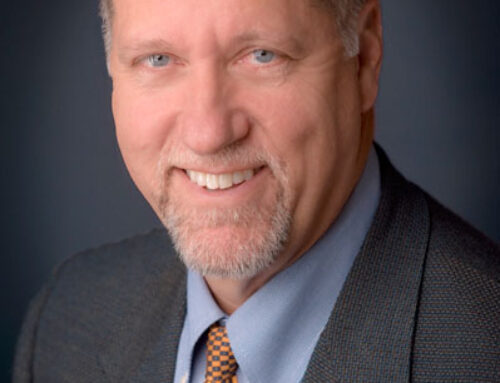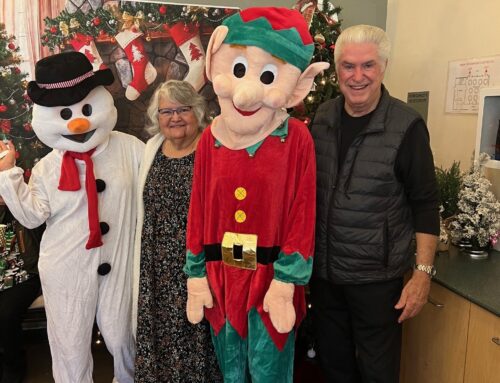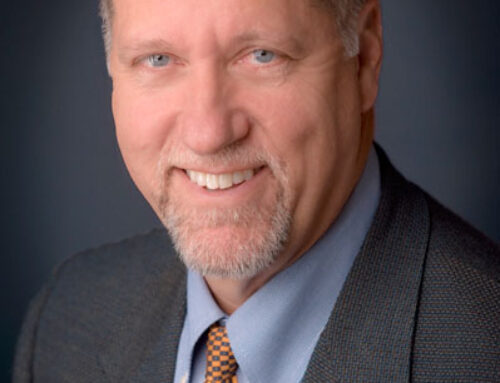Brian Shiroyama helped in setting up WWII exhibit in USS Hornet Museum
![]()
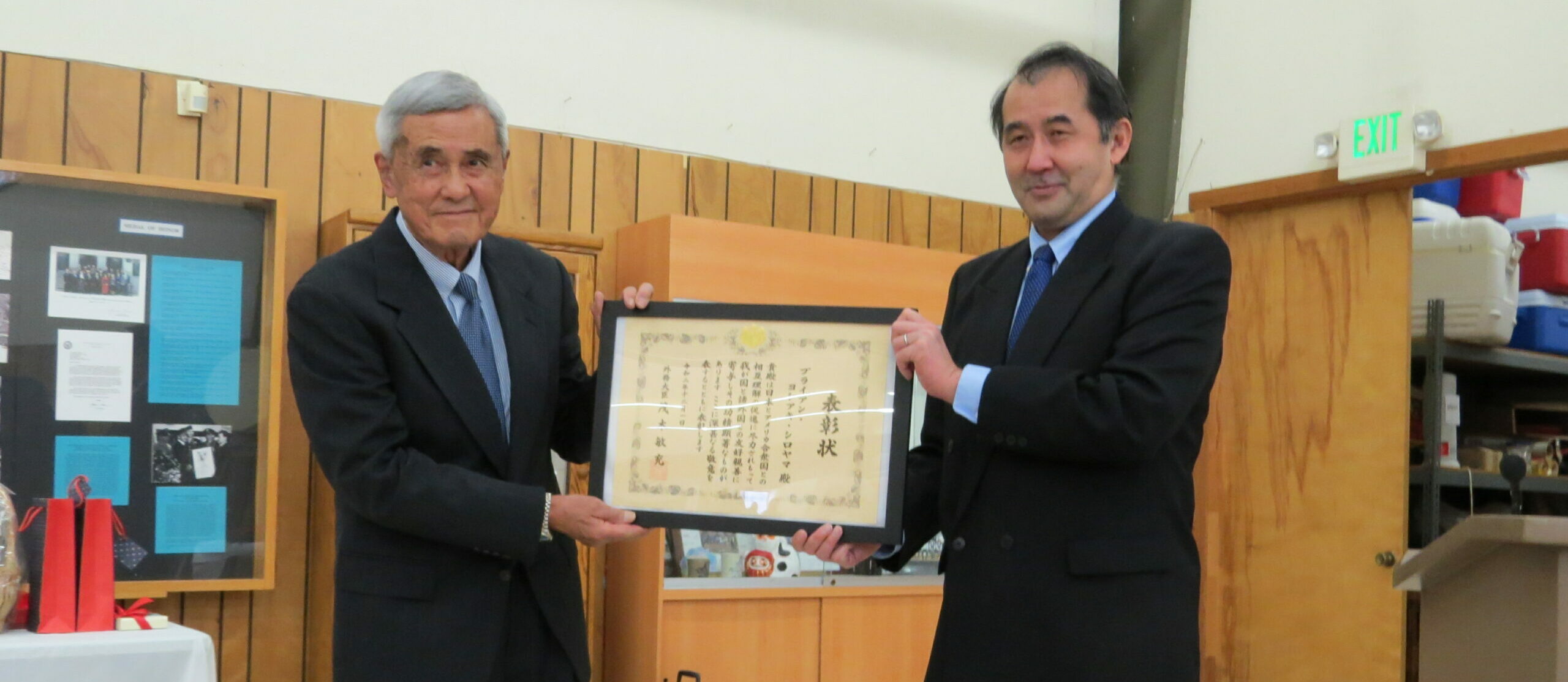
Brian Shiroyama is presented with the 2020 Foreign Minister’s Commendation from Yasushi Noguchi, the Consul General of Japan. Photo courtesy Marty Cheek
By Marty Cheek
It took two years because of the pandemic’s delay, but Morgan Hill resident Brian Yoshiaki Shiroyama this month received an impressive honor from the Japanese government.
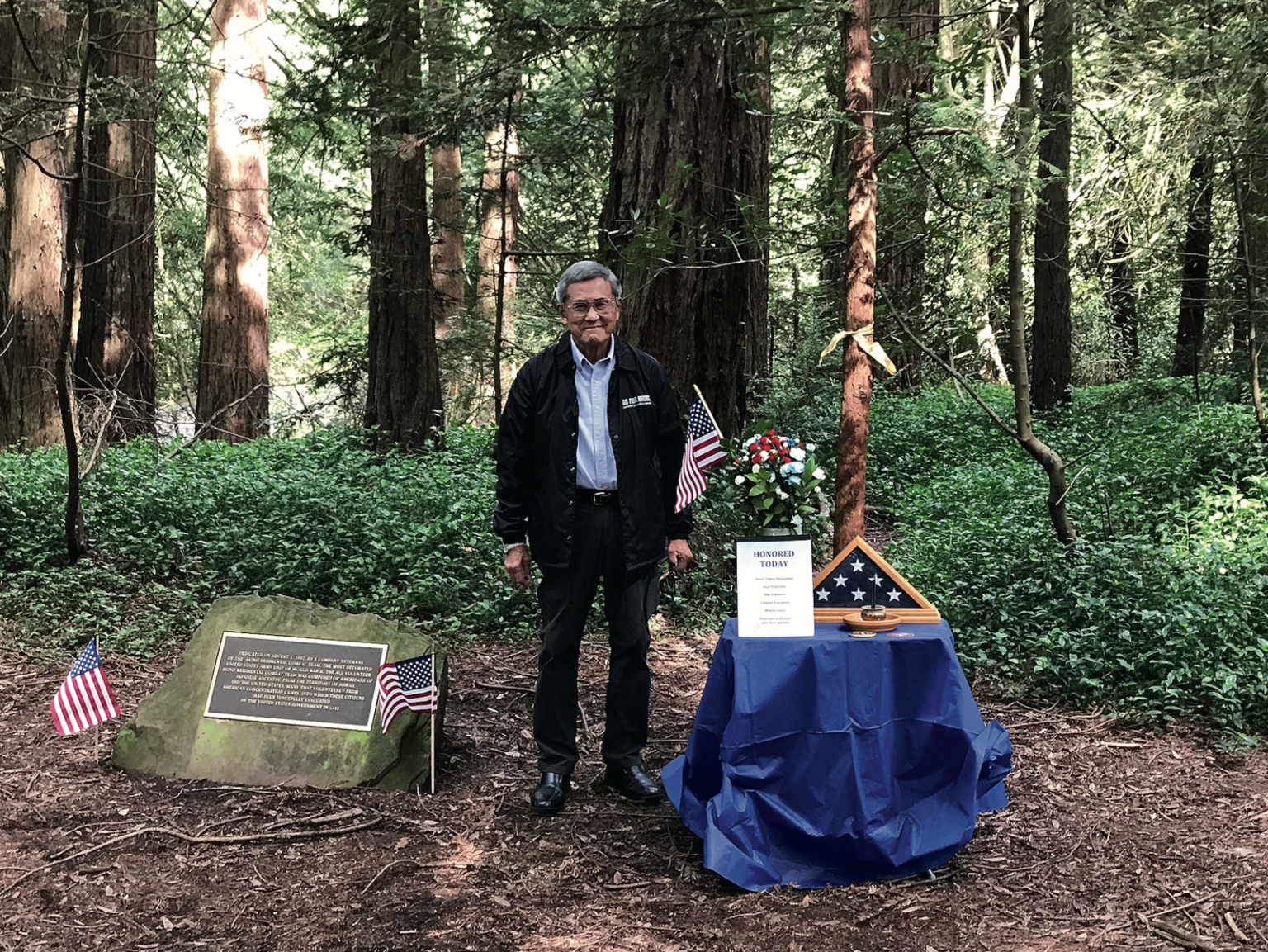
UC Berkeley alum Brian Shiroyama talked park service staff into letting him into Oakland’s Roberts Regional Park, where he stood under the redwood in silent vigil Alone among the redwoods, Shiroyama held the annual silent vigil honoring the 442nd Regimental Combat Team. Photo courtesy Brian Shiroyama
Japan’s Ministry of Foreign Affairs announced Dec. 1, 2020, the recipients of the Foreign Minister’s Commendations for that year. Within the Consulate General of Japan in San Francisco’s jurisdiction, three individuals and one organization received commendations for their contributions to strengthening relations between the U.S. and Japan.
At a special luncheon ceremony at the Morgan Hill Buddhist Community Center held Dec. 3, Shiroyama received a framed certificate of accomplishment from the Consulate General of Japan in San Francisco. Consul Yasushi Noguchi expressed his appreciation for Shiroyama’s many years of service as the vice president of the nonprofit Friends and Family of Nisei Veterans. The group of volunteers is dedicated to preserving the stories of the Japanese American soldiers who fought in World War II and sharing them with the public.
“It is clear that Mr. Shiroyama has dedicated himself to a lifetime of service and community activism,” Noguchi told the audience. “His tireless work and strong sense of duty are worthy of acknowledgment both here and in Japan. As such, the government of Japan is proud to recognize his contributions here today.”
The prestigious Foreign Minister’s Commendations go to individuals and organizations with outstanding achievements in international fields. The awards acknowledge their contributions to the promotion of friendship between Japan and other countries.
In receiving the award, Shiroyama acknowledged the contributions of other members of the Buddhist center. “Even though this (certificate) is presented to me, this is not my award. It is our award,” he said.
Shiroyama was born June 3, 1942, at the Manzanar War Relocation Center, an internment camp located in California’s eastern Sierras.
“I was too young to understand why I was there, but I learned later that it was a monumental injustice sanctioned by the government to imprison 120,000 of us in relocation camps,” he said.
After the war, his father took the family to Japan because there was no future for them in America. The father hoped his brother would help him get his life started again. Arriving in Japan the Shiroyama family learned the brother went to war and never came back.
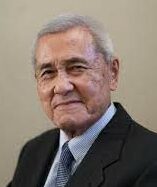
Brian Shiroyama
“Life in Japan after the war was not easy,” Shiroyama said. “It was especially difficult for me because I was discriminated against and bullied because I was American.”
That camp experience and his several years in Japan taught him a life philosophy of bringing people together so that “all of us can get along.”
After returning to the U.S., Shiroyama earned a bachelor’s degree in criminology from the University of California at Berkeley in 1966. He then joined the military. (In 1975 he earned a master’s in criminal justice/political science.) He served in the U.S. Air Force from 1967 to 1996, retiring as a full colonel.
Among his military assignments, he spent time in Japan due to his fluent bilingual ability. His main duty in his Air Force career was as a specialist in security and terrorism counteraction.
In 1970 Japan held a World Exhibition to show that the nation had recovered from the defeat of World War II. The Air Force appointed Shiroyama in charge of the security of the American Pavilion.
“One day, I had a most impressive visitor. He was a 10-year-old prince from the (Japanese) imperial family,” he told the audience. “When I was introduced to him, the prince said he was curious why someone with a Japanese name was working for the U.S. government.”
Brian explained he was a U.S. citizen.
“The prince nodded and smiled and I saw I had his approval and appreciation for my role,” Shiroyama said. “That was the moment when I first realized my life commitment to maintaining a good international relationship. And the prince’s name was Naruhito. He’s now the Emperor of Japan.”
A week later, Shiroyama played host to another prince. He was from Europe, a “flamboyant” boy who was not willing to abide by security instructions the Air Force officer gave him.
 Brian told him many times, “Please follow my instructions,” but the boy refused to listen.
Brian told him many times, “Please follow my instructions,” but the boy refused to listen.
“I became really, really frustrated,“ Shiroyama said, and smiled. “And now he’s the King of England.”
“That experience taught me that understanding other countries’ history and culture is an important foundation to achieving good relationships with other countries,” he said. “I should have been more understanding and tolerant of his behavior. I’m sorry, King Charles of the United Kingdom.”
After leaving the Air Force, Shiroyama worked as a district manager for several years at the formerly known Pinkerton Security Agency before retiring to devote his time to his volunteer activities in South Valley.
An active member of the Morgan Hill Buddhist Community Center, he is responsible for managing the maintenance and upkeep of the grounds and facilities. He worked in the Morgan Hill Sister Cities program by creating a relationship with the community and the Japanese city of Mizuho. His involvement created an active student exchange program that helps young people enjoy learning about each other.
He has been active for many years as one of the coordinators of the center’s Haru Matsuri Festival and Taiko Drum Expo.
A significant achievement of Shiroyama was putting together a special 100th/442nd Regimental Combat Team and Military Intelligence Service exhibit in the center’s annex building. With the partnership of his friend Lawson Sakai, a 442nd veteran, he installed a more extensive exhibit inside the USS Hornet Museum, a World War II era aircraft carrier docked in Alameda, to educate visitors on the Nisei contributions to the war effort.



